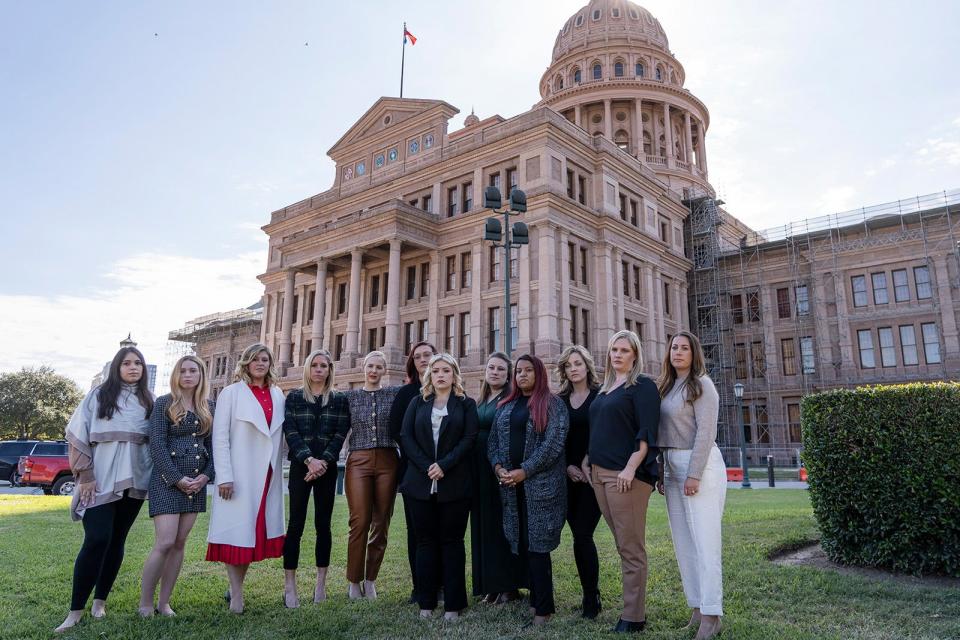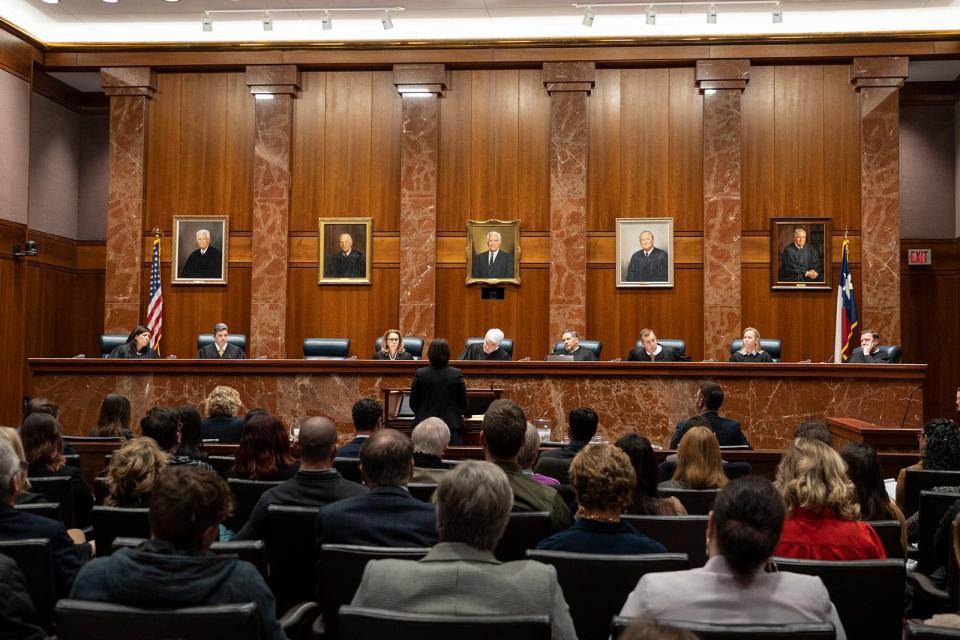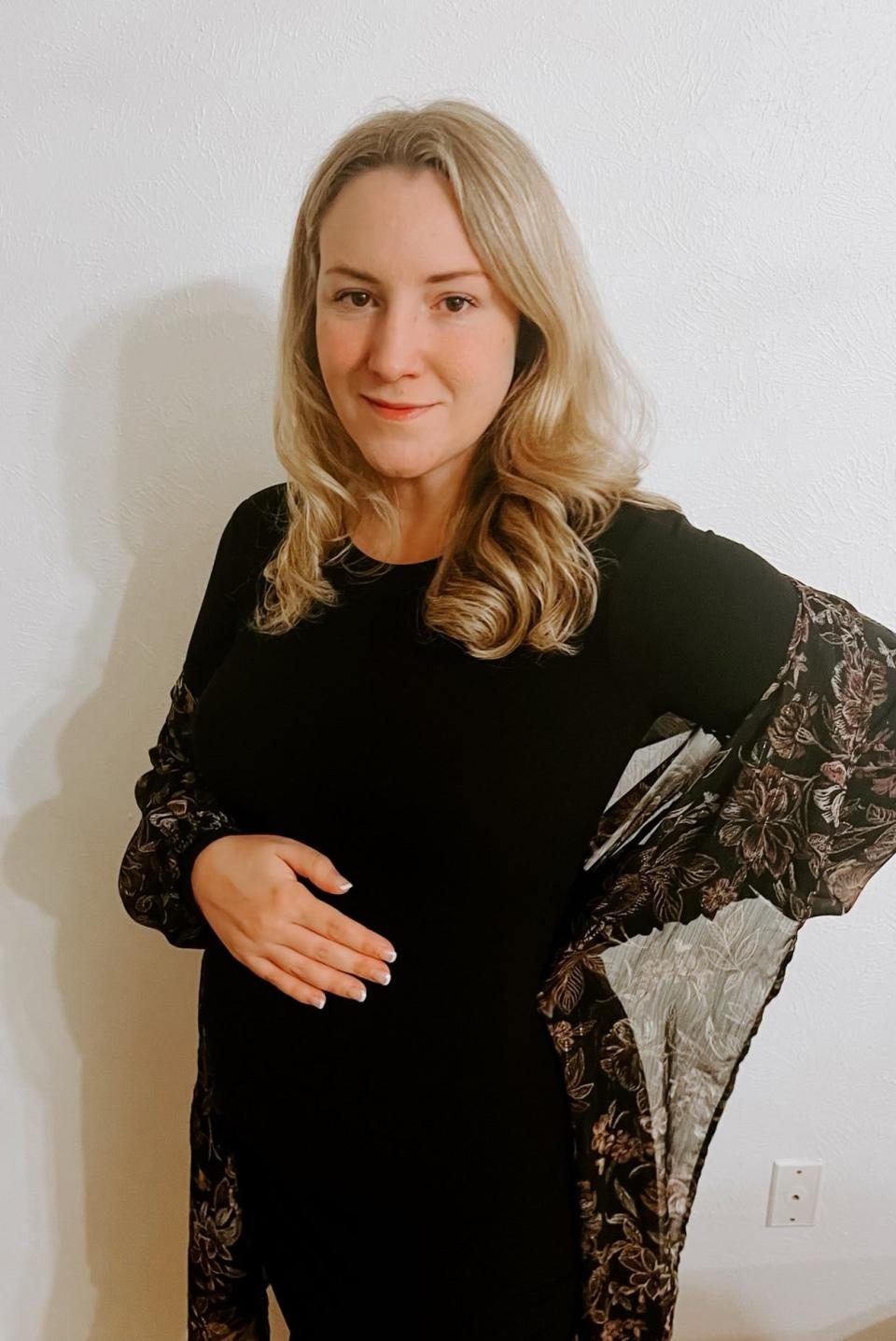Here's what the Texas Supreme Court's ruling against Kate Cox means for abortions
- Oops!Something went wrong.Please try again later.
The Texas Supreme Court has ruled against a woman seeking a medically indicated abortion for a fetus with a fatal diagnosis, marking the first time the high court has weighed in on the state’s post-Roe abortion bans.
Texas law prohibits abortion entirely after fertilization, granting exceptions only for cases in which a pregnant patient risks death or “substantial impairment of a major bodily function."
The seven-page Supreme Court opinion, which came down Monday evening, tosses out a district court's temporary restraining order from four days earlier that blocked the state from enforcing its abortion bans, clearing Cox to terminate her pregnancy.
Cox, a mother of two from Dallas, is carrying a fetus with full trisomy 18, a diagnosis her doctors told her leaves the unborn baby with "virtually no chance of surviving," according to her court filings. More than 95% of babies with the condition do not make it to birth, according to the Cleveland Clinic.

After a Travis County district judge cleared Cox for the procedure, Attorney General Ken Paxton petitioned the high court to reverse the ruling. The Supreme Court put the lower court's order on hold Friday night while it reviewed the case.
Cox's attorney said Monday that she had left the state to seek an abortion hours before the Supreme Court's final ruling. Cox's doctors had advised her that carrying the pregnancy to term would increase her risk of fertility loss and other health issues, according to her court filings. Her attorney said she had no option but to seek care out of state.
All nine Supreme Court justices are Republicans. Justices Jimmy Blacklock and John Devine concurred with the opinion, according to the filing, meaning they agreed with the decision but not the rationale behind it. The opinion did not list dissenting justices.
The ruling seems to provide some clarity that Cox's attorney and plaintiffs in Zurawski v. Texas, another abortion-related case that is pending before the Supreme Court, have asked for, including finding that a doctor does not have to "wait until the mother is within an inch of death" to administer a necessary abortion. It also acknowledges the difficulty doctors face in interpreting the law.
However, it still leaves uncertain the amount of discretion a doctor has to decide whether a condition is sufficiently life-threatening, experts said, and stops short of compelling the Texas Medical Board to issue further guidance.
The ruling also dampens hopes that the court will interpret the ban's exception to apply beyond very severe conditions.
"It shows how narrow the justices' interpretation of the health exception in Texas law is," Seema Mohapatra, a professor of law at Southern Methodist University, told the American-Statesman.
Here's more on the ruling and what it could mean for pregnant people in Texas going forward.

What the Cox opinion means for pregnant patients in Texas
While this case applies only to Cox, who is no longer seeking to terminate her pregnancy in Texas, it has broad ramifications, experts say.
It addresses the same questions at issue in Zurawski v. Texas, and the ruling "does not bode well" for that case, said Mohapatra, the Southern Methodist University law professor.
Plaintiffs in the Zurawski case include 20 women who were denied abortions amid severe pregnancy complications, including several women whose babies, like Cox's, were diagnosed with lethal fetal conditions. Filed by the Center for Reproductive Rights, an abortion rights organization, the petition argues that the vagueness of the state's abortion laws is unconstitutional and leads to subpar care from medical professionals.
During that case's hearing before the high court Nov. 28, Center for Reproductive Rights attorney Molly Duane argued that the court should adopt a "good faith" standard over "reasonable medical judgment." The justices made clear they are relying on the latter standard, legal experts told the American-Statesman.
The opinion also does not compel the Texas Medical Board to clarify medical exceptions — a request made by Zurawski plaintiffs. Instead, it suggests that the board provide examples, acknowledging that doctors remain confused by the law's language.
"The Texas Medical Board ... can do more to provide guidance in response to any confusion that currently prevails," the opinion states. "While the judiciary cannot compel executive branch entities to do their part, it is obvious that the legal process works more smoothly when they do."
Texas OB-GYNs will still be fearful to perform abortions as long as the Texas Medical Board does not issue this guidance, said Dr. Leah Tatum, an OB-GYN at Austin Regional Clinic and a fellow at the American College of Obstetricians and Gynecologists.
"I would appreciate an opinion or some assistance from the TMB as physicians in Texas will continue to be apprehensive in some cases where imminent harm is not obvious," Tatum told the American-Statesman. "No one wants to end up in criminal court for trying to do right by their patient, even if a lawsuit doesn’t hold water."
The justices pointed to Duane's argument about the law's vagueness causing physicians to wait until patients are in mortal danger before they perform an abortion, writing that doctors need not wait until patients are on the brink of death to provide the needed care. It also states that doctors will not be held to a standard of certainty or universal agreement on whether a patient meets the exception.
"The statute does not require 'imminence' or, as Ms. Cox’s lawyer characterized the State’s position, that a patient be 'about to die before a doctor can rely on the exception,’” the opinion states. "The exception is predicated on a doctor’s acting within the zone of reasonable medical judgment, which is what doctors do every day."

These assertions still don't settle the uncertainty around what "life-threatening conditions" constitute, Mohapatra said.
"The court draws a line with these statements, but it's not clear where that line is," Mohapatra said. "They're saying, 'You don't have to be at the brink of death,' but at what point do you have to be?"
Tatum said she "appreciates" this portion of the ruling but she's unsure it will change how she manages cases.
'Good faith belief' not enough for abortion exception; doctors' discretion unclear
In legal filings, Dr. Damla Karsan, Cox's OB-GYN, stated her "good faith belief" that Cox had a life-threatening condition putting the function of her reproductive systems at risk and that she qualified for the state's abortion exception on that basis.
But the ruling states a patient cannot qualify for an abortion unless a doctor asserts that they're using “reasonable medical judgment” — a higher standard than the “good faith belief” that attorneys for the Center for Reproductive Rights, which represented Cox, had asked the court to accept.
The focus on Karsan's failure to use the term "reasonable medical judgment" leaves the door open for the courts to question doctors' evaluations, even as the justices state doctors have discretion, said Mohapatra, the MD Anderson Foundation Endowed Chair of Health Law at SMU.
“It feels like gaslighting,” Mohapatra said. “The court is saying that this is a decision that only a doctor can make and judges don't get involved, yet at the same time, it's saying that the opinion of the doctor — Cox's doctor, in this case — didn't fulfill the statute. Essentially, the justices are making the decision.”
The term "reasonable medical judgment" comes from the requirement set out in House Bill 1280 — the state's "trigger law" outlawing abortions that went into effect Aug. 25, 2022, 30 days after Roe v. Wade, the landmark case that established a right to an abortion, was overturned — that doctors exercise "reasonable medical judgment" in determining whether a woman qualifies for a legal exception to an abortion ban.
Texas "laws reflect the policy choice that the Legislature has made, and the courts must respect that choice," the opinion states.
The opinion also states that Cox could legally still receive a "life-saving abortion" if her doctor's assessment of her condition changed, or if her condition worsened.
"Our ruling today does not block a life-saving abortion in this very case if a physician determines that one is needed under the appropriate legal standard, using reasonable medical judgment," the opinion states. "If Ms. Cox’s circumstances are, or have become, those that satisfy the statutory exception, no court order is needed."
However, this assertion still doesn't clarify whether the court is taking issue with the medical facts of Cox's case or her doctor's statements, said Mohapatra.
"If the doctor would have said that Cox risked substantial impairment of future fertility (with reasonable medical judgment), is that judgment enough?" Mohapatra asked. "Or is the court going to intervene in that case as well?"
What's next
The ruling has drawn condemnation of Texas' abortion ban from Democrats in the state and across the country, including from the White House and Vice President Kamala Harris, while Republicans have largely avoided commenting.
“Since Roe v. Wade was overturned, Republican elected officials have imposed dangerous abortion bans that put the health of women in jeopardy, force women to travel out of state for care, and threaten to criminalize doctors,” White House Press Secretary Karine Jean-Pierre said Monday evening in a statement on X, formerly Twitter. “Their agenda is extreme and out-of-step with the vast majority of Americans.”
The Texas Democratic Party said in a news release that no one should be forced to carry a pregnancy to term against their will.
"The MAGA Republican Party is running on a platform of authoritarianism, forced birth, and human suffering," the party said.
Neither Gov. Greg Abbott nor the Texas GOP has commented on the Cox case or the high court's ruling. Neither office responded to multiple American-Statesman requests for comment Monday and Tuesday.
Tatum, the Austin OB-GYN, was "not overly surprised" by the ruling but said it still leaves mothers without sufficient rights and protections during pregnancy.
"I still believe we can do better in the state of Texas than to continue to uphold that the fetus that Kate (Cox) is carrying has more rights than she does," Tatum said. "Pregnancy is not a benign undertaking. Carrying a pregnancy to term and undergoing a delivery will continue to carry more risk to the person carrying that pregnancy than an abortion."
However, the case could advance access to medically necessary abortions if it leads the Texas Medical Board to specify examples in which a woman would meet the exception, she said.
"Any improvement in access to this care for patients like Kate would be an improvement for Texans," Tatum said.
A more broad and definitive ruling on the question of exceptions to the ban is expected to be issued by the high court in Zurawski v. Texas by the end of June.
This article originally appeared on Austin American-Statesman: How the Texas Supreme Court ruling against Kate Cox affects abortions

